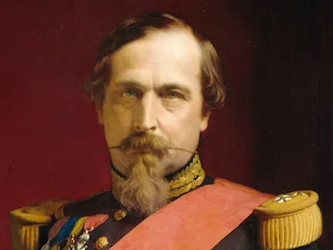
Napoleon III (Charles-Louis Napoléon Bonaparte; 1808-1873, age 65) was the first president of France from 1848 to 1852, and the last monarch of France as Emperor of the French from 1852 until he was deposed on 4 September 1870.
Prior to his reign, Napoleon III was known as Louis Napoleon Bonaparte. He was born in Paris as the son of Louis Bonaparte, King of Holland (r. 1806–1810), and Hortense de Beauharnais. Napoleon I was Louis Napoleon’s paternal uncle, and one of his cousins was the disputed Napoleon II. Louis Napoleon was the first and only president of the French Second Republic, elected in 1848. He seized power by force in 1851 when he could not constitutionally be re-elected. He later proclaimed himself Emperor of the French and founded the Second Empire, reigning until the defeat of the French Army and his capture by Prussia and its allies at the Battle of Sedan in 1870.
Napoleon III was a popular monarch who oversaw the modernization of the French economy and filled Paris with new boulevards and parks. He expanded the French colonial empire, made the French merchant navy the second largest in the world, and personally engaged in two wars. Maintaining leadership for 22 years, he was the longest-reigning French head of state since the fall of the Ancien Régime, although his reign would ultimately end on the battlefield.
Napoleon III commissioned a grand reconstruction of Paris. He expanded and consolidated the railway system throughout the nation and modernized the banking system. Napoleon promoted the building of the Suez Canal and established modern agriculture, which ended famines in France and made the country an agricultural exporter.
He negotiated a free trade agreement with Britain and similar agreements with France’s other European trading partners. Social reforms included giving French workers the right to strike, the right to organize, and the right for women to be admitted to a French university.
In foreign policy, Napoleon III aimed to reassert French influence in Europe and around the world. In Europe, he allied with Britain and defeated Russia in the Crimean War (1853–1856). His regime assisted Italian unification by defeating the Austrian Empire in the Second Italian War of Independence. At the same time, his forces defended the Papal States against annexation by Italy.
He was also favorable towards the 1859 union of the Danubian Principalities, which resulted in the establishment of the United Principalities of Moldavia and Wallachia. Napoleon doubled the area of the French colonial empire with expansions in Asia, the Pacific, and Africa. On the other hand, the intervention in Mexico, which aimed to create a Second Mexican Empire under French protection, ended in total failure.
From 1866, Napoleon had to face the mounting power of Prussia as its minister president Otto von Bismarck sought German unification under Prussian leadership. In July 1870, Napoleon reluctantly declared war on Prussia after pressure from the general public. The French Army was rapidly defeated, and Napoleon was captured at Sedan. He was swiftly dethroned and the Third Republic was proclaimed in Paris. After he was released from German custody, he went into exile in England, where he died in 1873.